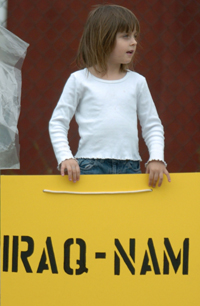|
Occupation Remains,
|
 |
As happened during the Vietnam War, a consensus is building that the U.S. cannot win in Iraq and that the war and occupation have no moral foundation. |
"April is the cruelest month," wrote T.S. Eliot.
That was certainly true this year if you were an Iraqi family trying to survive the U.S. assault on Fallujah that raged for weeks and left 600 or more civilians dead. It was true if you were among the thousands of ordinary Iraqis arrested and held by the U.S. occupation forces--of whom the International Committee of the Red Cross says 70 to 90 percent are innocent. And it was especially true if you were held in the torture centers of Abu Ghraib prison.
For George Bush or Donald Rumsfeld, however, May or June might have been crueler. As evidence of the systematic torture of Iraqis continued to mount, the last remaining pillar of false U.S. justification for war, that of "bringing democracy to Iraq," collapsed.
And if you were United Nations Secretary General Kofi Annan or his special representative in Iraq, Lakhdar Brahimi, the run-up to Washington's June 30 "transfer of sovereignty" might qualify as the worst of times. As The New York Times has noted, "Mr. Brahimi appears to have folded, acquiescing to the desires of the Americans." The U.N. faced the world's anger for caving in to U.S. demands.
The June 30 "transfer of power" is a sham while 135,000 U.S. troops, under sole U.S. command, remain in the country.
The White House has lost the battle for Iraqi hearts and minds. By May four out of five Iraqis held a negative view of the U.S. occupation authority and U.S. troops. With the uncovering of the Abu Ghraib torture scandal, the U.S. lost whatever shreds of moral authority it once claimed in Iraq, the Arab world or the international community.
At home President Bush is losing support fast. By mid-May a University of Pennsylvania poll showed that a majority of Americans believed the war was not worth the price, and 64 percent of Americans believed the president does not have a clear plan for Iraq.
The president scheduled a series of speeches to explain and justify his Iraq policy. But U.S. policy remains a shambles, a recipe for continuing U.S. occupation, mounting death tolls and the destruction of Iraq’s physical infrastructure and natural environment.
The U.N.'s acquiescence to the U.S. in selecting the new Iraqi interim government shocked even those observers accustomed to U.S. domination of the global body. If U.S. pressure made it impossible for Brahimi to appoint non-political technocrats instead of Governing Council members to run the country and prepare for elections in 2005, he should have acknowledged that failure and withdrawn.
Such a withdrawal would have exposed the illegitimacy of the U.S. "transfer of power." Instead, the U.N. "bluewashed" the process, providing the illusion of international credibility to the illegal U.S. occupation and its handpicked Iraqi government.
The public exposure of the horrific torture at Abu Ghraib and other prisons across Iraq shows that racism and anti-Arab demonization lie at the heart of U.S. policy in the region. But neither exposé alone, nor the prosecution of a few low-ranking soldiers (however necessary), mean that a change is underway at the center of U.S. policymaking circles.
Only an end to the occupation and withdrawal of the troops, can reverse the drive towards empire that continues to shape our increasingly dangerous world.
Phyllis Bennis is author of Before and After: U.S. Foreign Policy and the September 11th Crisis and a fellow at the Institute for Policy Studies in Washington, D.C.
| Month in Review |
|---|
|
August 2010: |
| PAST articles |
Detoit: I Do Mind Empire (USSF Recap) “Bring the War (English) Time for Rebirth: (English) War Weariness, Military Heft, and (English) The Global Military Industrial Complex (English) A Stalled (English) Bush's Iraq “Surge”: Mission Accomplished? Iran: Let's Start with Some Facts Nuclear Weapons Forever (English) Time to End the Occupation of Iraq First-Hand Report from the Middle East (English) Haditha is Arabic (English) A Movement to End Militarism From Soldier to Students Not Soldiers Israel's "Disengagement" U.S. Soldiers Torture: Help Stop Torture — Be All You Can Be: OCTOBER 2006
|
|
War Times/Tiempo de Guerras is a fiscally sponsored project of the |